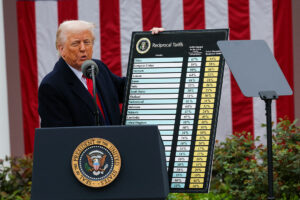By Chloe Mari A. Hufana, Reporter
THE PHILIPPINES should expand its trade relations with ASEAN, China, and the European Union (EU) in response to the 20% tariff imposed by the US, regardless of the outcome of President Ferdinand R. Marcos, Jr.’s visit to Washington next week, an academic said.
Josue Raphael J. Cortez, who lectures on diplomacy at the College of St. Benilde, said the Philippines needs to prepare to trade with alternative partners if negotiations with the US falter.
The new tariff is higher than the 17% rate initially assigned to the Philippines in early April.
“Should ASEAN members fail to achieve their aim to lower the tariffs, bolstering trade ties with their neighbors would be the way to go,” he said via Messenger chat. “It is high time that the bloc members strengthen their trading with one another because trade has been stagnant for the longest time at roughly 20-30%.”
Philippine exporters are not expected to be competitive at the 20% tariff, while the narrower differential relative to export competitors also weakens the case for relocating factories here.
Ahead of the Washington meeting, Mr. Cortez said Manila must prepare fallback options if talks fail to result in a tariff rollback.
China remains the Philippines’ largest trading partner, with the US coming in third, but the territorial dispute with Beijing complicates the prospect of deeper cooperation.
“Further deepening our economic ties with it can be a boon or a bane for us,” Mr. Cortez said.
The South China Sea remains a source of friction with China, with ties between Beijing and Manila at their worst in years in the face of frequent ship-to-ship confrontations in the Philippine exclusive economic zone.
The tariff uncertainty highlights the urgency of bringing ASEAN economies deeper into their integration project.
“It is high time that ASEAN members once again strengthen trading with one another, especially if they fail to achieve their aim of lowering tariffs with external partners,” Mr. Cortez said.
President Donald J. Trump imposed fresh tariffs on key members of the 10-nation bloc, with Vietnam managing to lower its rate to 20% from 46% in April.
Mr. Cortez also pointed to the EU as a potential alternative economic partner should negotiations with the US turn sour. The EU is the Philippines’ fourth-largest trading partner and a major source of foreign direct investment.
“Given that we are aligned with it both politically and economically, it will also be a good opportunity for us to further solidify our relationship,” he added.
Successful negotiations with Washington this month would bolster Mr. Marcos’ diplomatic standing ahead of his State of the Nation Address later this month, according to Mr. Cortez.
“It will not simply show how influential he is as the chief architect of Philippine foreign policy. It may also reflect his regime’s commitment to international norms and standards,” he said.
A successful negotiation with Washington may signal that Manila is a viable partner for open markets, willing to adjust and adapt to changing times, he noted.
“Despite nuanced views, with some arguing that we are heavily reliant on Washington, we still ascertain as a country that should we find something debilitating to our interests, we will not hesitate to utilize all the possible means for us to renegotiate something for ourselves,” he added.
According to a Reuters report last week, Foreign Affairs Secretary Ma. Theresa P. Lazaro confirmed the first meeting between the two presidents.
Ms. Lazaro told Reuters the fresh tariffs will be discussed, among others, with a Philippine delegation bound for Washington this week to negotiate.
A White House official earlier told Reuters the meeting was set for July 22. Philippine officials have announced the dates for the Marcos visit as July 20-22.
The US goods trade deficit with the Philippines widened to $4.9 billion in 2024, a 21.8% increase from 2023.

